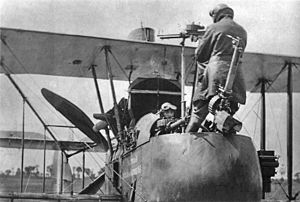Leslie Court facts for kids
Quick facts for kids
Leslie Simpson Court
|
|
|---|---|
| Born | 1897 Romney Marsh, Kent, England |
| Died | 10 December 1918 (aged 20–21) 1st Scottish General Hospital, Aberdeen |
| Buried | |
| Allegiance | United Kingdom |
| Service/ |
British Army Royal Air Force |
| Rank | Second Lieutenant |
| Service number | 10060 |
| Unit | No. 25 Squadron RFC |
| Battles/wars | World War I |
| Awards | Médaille Militaire (France) |
Leslie Simpson Court (born 1897 – died 10 December 1918) was a brave British pilot during World War I. He was known as a "flying ace" because he helped shoot down eight enemy planes. He did this while working as an observer and gunner in a special unit called No. 25 Squadron.
About Leslie Simpson Court
His Early Life
Leslie Simpson Court was born in 1897. His family lived at Eyhorne Green Farm in a place called Hollingbourne. His parents were George Robert and Sarah Ann Head Court.
Serving in the War
Leslie Court joined the British Army during World War I. In 1916, he was a soldier known as an Air Mechanic 2nd Class. He flew in planes called FE.2B's with No. 25 Squadron.

He started getting victories with pilot Lancelot Richardson. On June 26, they destroyed a German Fokker Eindekker plane. On July 15, Court helped destroy another Eindekker. Five days later, he and Richardson destroyed one Eindekker and forced another down.
After Richardson was hurt, Court flew with Corporal Thomas Mottershead. On August 5, Court and another pilot, W. H. Rilett, were shot down. Their plane crashed behind British lines and was then shelled.
Just over a month later, on September 9, Court flew with Noel Webb. They forced a German two-seater plane out of control. This made Court a "flying ace," meaning he had five or more victories. He was then promoted to Sergeant.
On September 27, Court flew with Victor William Harrison. They shot down a German two-seater plane, but their plane was also shot down. Everyone survived. Court had two more victories with fellow ace James Leith Leith. One was on October 22, and the other was on November 9.
On May 1, 1917, Court received a special award from France. It was called the Médaille Militaire, which means "Military Medal."
On October 25, 1917, Court became a Second Lieutenant. He was serving at a training station when he passed away. He died on December 10, 1918, at a hospital in Aberdeen. He is buried at All Saints Church in Hollingbourne, Kent.
 | John T. Biggers |
 | Thomas Blackshear |
 | Mark Bradford |
 | Beverly Buchanan |

